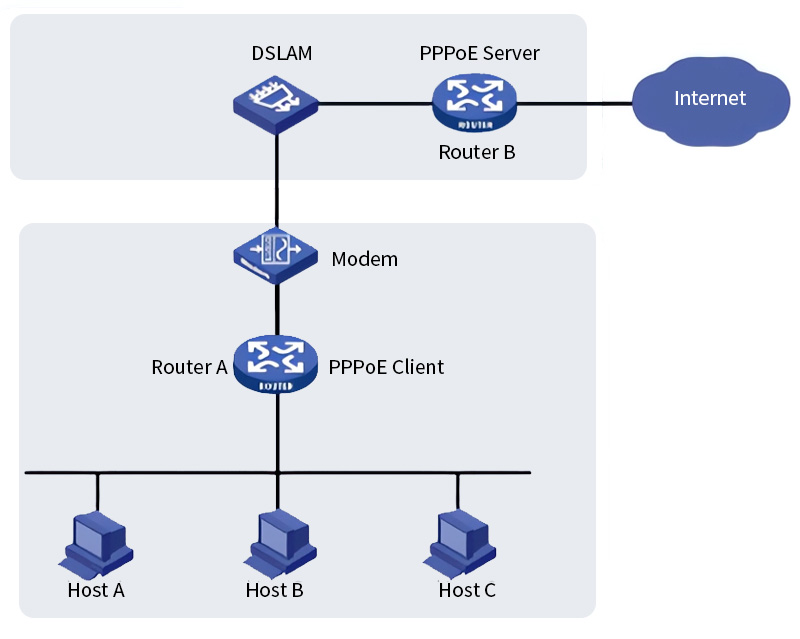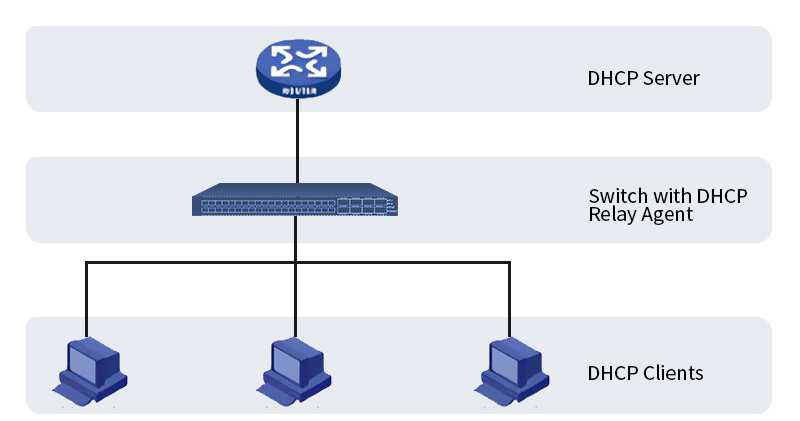How to Choose Between PPPoE and DHCP
The topic of PPPoE vs DHCP piques everyone's curiosity in the industry. First of all, we need to understand what they are. PPPoE (Point-to-Point Protocol over Ethernet) and DHCP (Dynamic Host Configuration Protocol) are two standard protocols used in networking. The role of PPPoE is to establish a point-to-point connection between two nodes through Ethernet, and the part of DHCP is to assign IP addresses to devices on the network automatically. This article will help you understand PPPoE vs DHCP to help you better choose the products you need.
PPPoE VS DHCP
PPPoE Meaning
PPPoE is a protocol for establishing a secure point-to-point connection between the user equipment and an Internet Service Provider (ISP). It requires users to verify their identity before allowing access to the network, meaning only authorized users can connect.
When establishing a connection, the client device sends a PADI (PPPoE Active Discovery Initiation) packet to the PPPoE server through an Ethernet switch or hub. After receiving the PADI packet, it will return a PADO (PPPoE Active Discovery Offer) packet. Then, the client device will select a PPPoE server and send a PADR packet (PPPoE Active Discovery Request) to request a connection. After the server receives the PADR packet, it will send a PADS (PPPoE Active Discovery Session-Confirmation) packet to the client to indicate that the connection has been established.
PPPoE is often used in scenarios with high-security requirements, such as in an enterprise network, where multiple users need to access the Internet through a single connection.
Juniper Networks. (n.d.). Configuring PPPoE on security devices interfaces (CLI procedure) - Technical Documentation - Support - Juniper Networks. Retrieved April 14, 2023, from PPPoE
DHCP Meaning
DHCP is a protocol for automatically assigning IP addresses. When a network device is connected, the server automatically assigns an IP address, and users can access the network without authenticating their identities.
When the device is connected to the network, it will send a DHCP request to the DHCP server, and the DHCP server will return an IP address and other configuration information. Currently, the device can use the returned IP address to communicate with other devices on the network and access the Internet. In this process, the user can access the Internet without authenticating themselves. DHCP is usually applicable to large-scale networks or mobile device networks.
Automatically assigning IP addresses and other network configuration information simplifies network management and reduces configuration errors and management costs.
Microsoft. (n.d.). DHCP top. Retrieved April 14, 2023, from DHCP
Comparison of PPPoE vs DHCP
PPPoE and DHCP are two different protocols with distinct functions. The main differences between them are as follows:
The Function of PPPoE and DHCP
PPPoE is primarily used to establish a reliable connection between client devices and an ISP, providing user certification, billing, and bandwidth control. Conversely, DHCP is mainly used to automatically allocate IP addresses and other network configuration information, simplifying network management and reducing configuration errors and costs.
The Different Working Methods Between PPPoE vs DHCP
The PPPoE protocol forwards data packets to the ISP through the PPP protocol, achieving user certification, billing, and bandwidth control through PPP certification and control. In contrast, the DHCP protocol broadcasts DHCP requests on the network using the UDP protocol. After receiving the request, the server automatically allocates an IP address and other network configuration information.
PPPoE Configuration vs DHCP Configuration
The PPPoE protocol forwards data packets to the ISP through the PPP protocol, achieving user certification, billing, and bandwidth control through PPP certification and control. In contrast, the DHCP protocol broadcasts DHCP requests on the network using the UDP protocol. After receiving the request, the server automatically allocates an IP address and other network configuration information. When connecting to the Internet with PPPoE, client devices must configure information such as the PPPoE client software and the PPPoE server address. Conversely, when using DHCP to allocate an IP address automatically, client devices only need to enable the DHCP client function without any other configurations.
What is more secure, PPPoE or DHCP?
PPPoE provides authentication to prevent unauthorized access and protect sensitive information. Conversely, DHCP does not provide any authentication, making it less secure.
Different Network Size
DHCP is suitable for large networks where the manual configuration of IP addresses can be time-consuming and prone to errors. It can also be helpful in networks with many mobile devices that frequently join and leave the network. In contrast, PPPoE may be more suitable for smaller networks or those requiring greater bandwidth usage control.
Network Control
PPPoE enables network administrators to control the bandwidth usage of each user, which is helpful in situations where bandwidth needs to be managed. Conversely, DHCP does not provide this level of control.
Ease of Use
DHCP is generally easier to set up and use compared to PPPoE. It is an automated process that does not require manual configuration by the end user. PPPoE, however, requires manual configuration of the client software and server address, making it less user-friendly.
Cost-Effective
PPPoE may involve additional costs, such as purchasing and installing PPPoE client software, whereas DHCP is usually included as part of the networking infrastructure. In this aspect, DHCP is more cost-effective.
Qsfptek. (2023, April 14). What is the Difference Between PPPoE and DHCP? [Blog post]. Retrieved from Different between PPPoE and DHCP
Different use scenarios between PPPoE vs DHCP
The PPPoE protocol is mainly used in user authentication, accounting, and bandwidth control scenarios. For example, in school dormitories, students' networks may need to be billed separately, and identity verification is required to access different levels of broadband services. Protecting the school network and preventing information leakage is also critical.
The PPPoE protocol adds an authentication layer between the data link and network layers to achieve these functions and separate authentication from data traffic. Only authenticated users can access the network, which helps ensure network security.
In this network structure, the student's personal computer is connected to the router, and the router establishes a connection with the network provider's server through the PPPoE protocol, obtains network access rights through identity verification, and then accesses internet resources. Due to the use of the PPPoE protocol, the school can improve network security and ensure that only authenticated users can access the network.
DHCP is used when IP addresses and other network configuration information must be automatically assigned to many devices. For example, in an enterprise where many devices need to connect, mobile devices frequently connect and disconnect from the network. In this case, using PPPoE requires manual configuration of IP addresses, which is cumbersome. Using the DHCP protocol, network administrators can automatically assign network configuration information to each device without manual configuration, making network management more efficient.
The DHCP topology diagram below illustrates a simple network configuration where multiple devices connected to a switch that supports the DHCP protocol send DHCP requests to a DHCP server to obtain IP addresses and other network configuration information, such as DNS server addresses and default gateways. A DHCP server can assign a random IP address to each device connected to the network, simplifying network management, reducing configuration errors, and reducing management costs.
Conclusion
Through this article, we learn about PPPoE vs DHCP. PPPoE is best suited for small networks or networks requiring better bandwidth usage and security control. In contrast, DHCP is best suited for large networks where IP address configuration can be time-consuming and prone to errors. Ultimately, the choice between PPPoE and DHCP depends on the specific network requirements of an organization or individual. Both protocols have advantages and disadvantages, and it is up to the network administrator or end-user to decide which is more suitable for their needs. If you have any questions about PPPoE and DHCP, please feel free to contact QSFPTEK's CCIE/HCIE engineers at [email protected].














